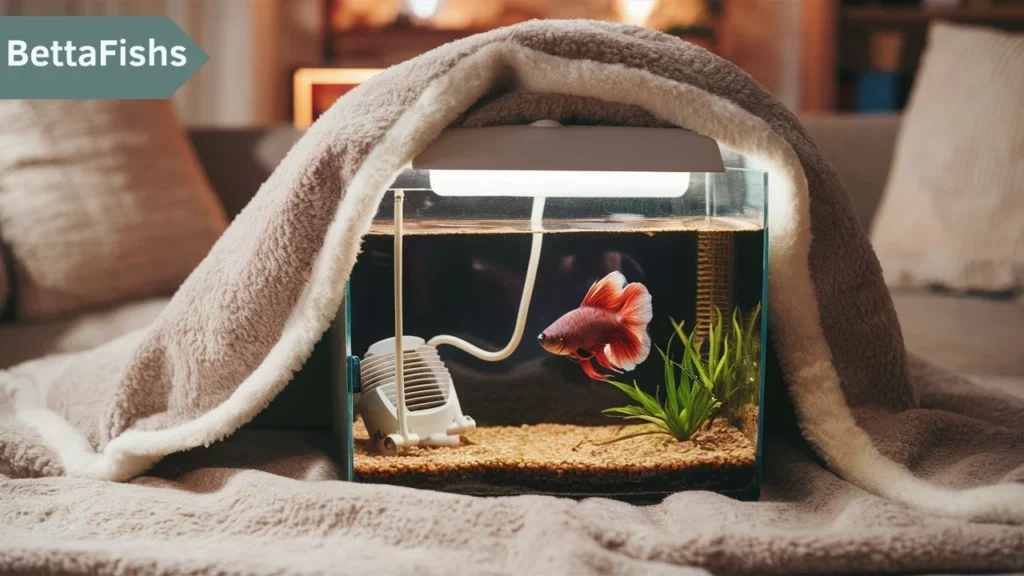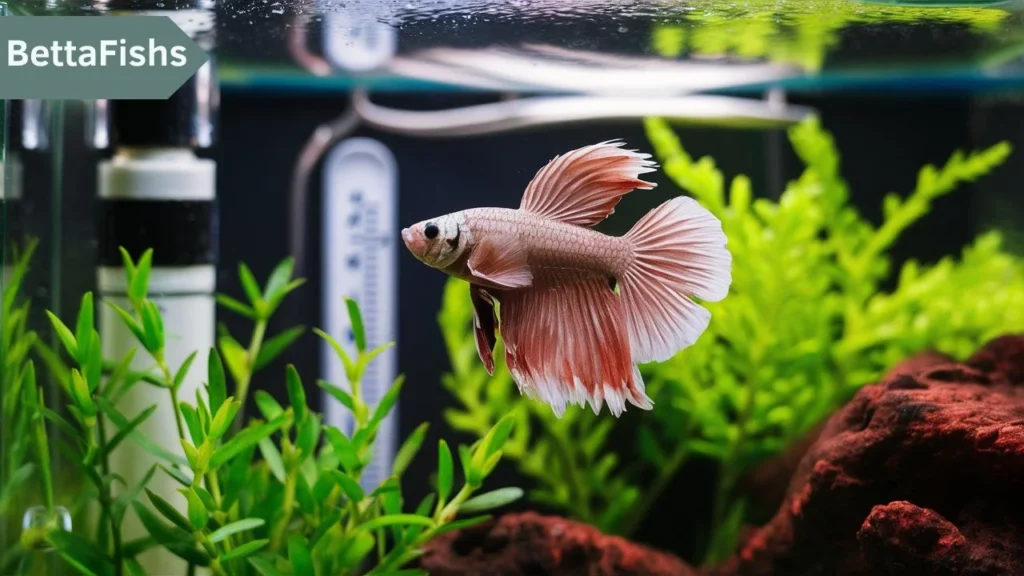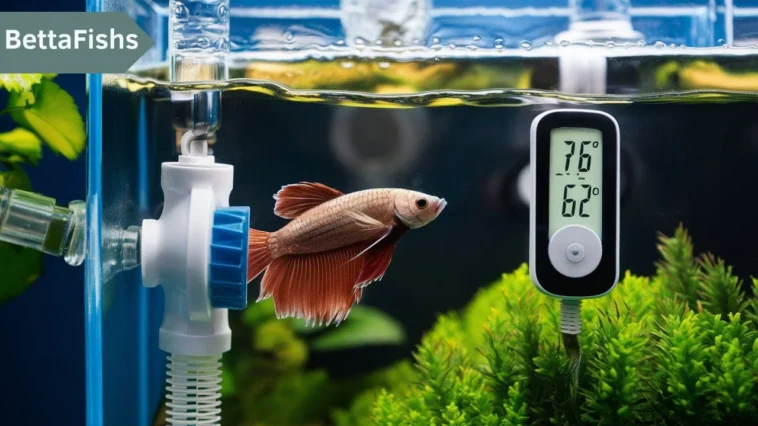Betta fish are known for their vibrant colors and lively personalities, but keeping them happy and healthy requires more than just a pretty tank. One of the most critical factors in their care is maintaining the right water temperature.
If you’ve ever wondered how to warm betta fish water effectively, you’re in the right place. In this guide, we’ll dive into everything you need to know about keeping your betta’s environment cozy and just right especially “How to warm Betta fish water?”.
Betta Fish Temperature Needs
Why Temperature Matters for Betta Fish
Betta fish are tropical creatures, which means they thrive in warm water. A sudden drop in temperature can stress your betta, leading to a weakened immune system and making them more susceptible to diseases. On the flip side, water that’s too warm can cause hyperactivity and even shorten their lifespan.
Ideal Temperature Range for Betta Fish
The sweet spot for betta fish is between 76°F and 82°F (24°C – 28°C). This range mimics the warm, shallow waters of Southeast Asia, where bettas naturally live. Keeping your tank within this range will help your betta stay healthy and active.
Signs Your Betta Fish is Too Cold
- Lethargy: Cold water can slow down your betta’s metabolism, making them sluggish and inactive.
- Clamped Fins: If your betta’s fins are pressed tightly against their body, it’s a sign they’re feeling cold.
- Loss of Appetite: Betta fish may refuse to eat if the water temperature drops too low.
- Color Fading: Cold temperatures can cause your betta’s vibrant colors to dull over time.
Ways to Warm Betta Fish Water
1. Use an Aquarium Heater
Choosing the Right Heater
An aquarium heater is the most reliable way to maintain a consistent temperature. Select a heater that is suitable for your tank’s capacity. A 25-watt heater is usually sufficient for tanks up to 5 gallons, while larger tanks may require a 50-watt or 100-watt heater.
Setting Up the Heater
Place the heater near the water flow, like the filter outlet, to ensure an even distribution of heat. Set the heater to your desired temperature within the ideal range, and use a thermometer to monitor the water temperature regularly.
2. Adjust the Room Temperature
Controlling Ambient Temperature
If your betta’s tank is in a room that’s too cold, try increasing the room temperature. Space heaters can help, but be cautious not to overheat the room, which could cause the tank water to get too warm.
Avoiding Drafts and Cold Spots
Keep the tank away from windows, doors, and vents that can create drafts or cold spots. Even a small draft can cause the water temperature to drop.

3. Insulate the Tank
Using Tank Covers and Insulation
Covering your tank with a lid or a towel can help retain heat, especially at night when temperatures tend to drop. For extra insulation, you can wrap the tank in a blanket, but make sure not to cover the heater or any ventilation.
Adding a Tank Hood
A tank hood can also help maintain a stable temperature by trapping heat. Just be sure to leave some space for air circulation to avoid humidity buildup.
Emergency Methods to Warm Betta Fish Water
1. Warm Water Changes
In a pinch, you can warm your betta’s tank by adding small amounts of warm (not hot) water. Be sure to mix it gradually to avoid shocking your fish.
2. Use a Hot Water Bottle
Fill a hot water bottle and place it against the side of the tank, outside the glass. This method is a temporary fix and should be done with caution to prevent overheating.
3. Submersible Heaters
Submersible heaters, designed for quick warming, can be used in emergencies. They are not a permanent solution but can help raise the temperature quickly if your main heater fails.
Monitoring and Maintaining Betta Fish Water Temperature
Using a Thermometer
A reliable aquarium thermometer is essential for monitoring your tank’s temperature. Digital thermometers with probes are accurate and easy to read.
Regular Temperature Checks
Check the temperature daily, especially during seasonal changes when room temperatures can fluctuate. This habit ensures you catch any issues early before they affect your betta.
Backup Heaters
Having a backup heater on hand can be a lifesaver in case your primary heater malfunctions. It’s better to be prepared than to scramble during an emergency.

How to Prevent Water Temperature Fluctuations
1. Maintain a Stable Environment
Keeping your tank in a room with a consistent temperature is key to preventing fluctuations. Avoid placing the tank near windows, air conditioners, or heaters that can cause sudden temperature changes.
2. Use a Reliable Heater
Investing in a high-quality heater with a built-in thermostat will help maintain a stable temperature. Some heaters even have fail-safes that shut off if the water gets too hot.
3. Consider Tank Size
Larger tanks are less prone to temperature fluctuations because they hold more water, which takes longer to heat up or cool down. If you’re struggling with temperature stability, consider upgrading to a larger tank.
Conclusion
Keeping your betta fish’s water at the right temperature is crucial for their health and well-being. By understanding their temperature needs and taking proactive steps to maintain a stable environment, you can ensure your betta thrives. Whether you’re using a heater, adjusting room temperature, or insulating the tank, these methods will help you keep your betta comfortable and happy.
FAQs
1. What’s the quickest way to warm betta fish water?
Using a submersible heater is the quickest way to raise the water temperature, especially in an emergency.
2. Can I use a regular thermometer to check my betta tank’s temperature?
It’s best to use an aquarium thermometer, as they are designed for underwater use and provide more accurate readings.
3. How often should I check the water temperature in my betta tank?
Daily checks are recommended, especially if the tank is in a room with fluctuating temperatures.
4. Can betta fish survive in cold water?
Betta fish can survive in cooler water temporarily, but prolonged exposure can lead to stress and health issues.
5. What happens if the water is too warm for my betta?
Overly warm water can increase your betta’s metabolism, leading to hyperactivity and a shorter lifespan.





10 Comments
Leave a Reply10 Pings & Trackbacks
Pingback:Can I use bottled water for Betta fish?
Pingback:Best water temperature for Betta fish
Pingback:How long can a Betta fish live without water?
Pingback:What should the water temperature be for a Betta fish?
Pingback:How Long Can a Betta Fish Live in Tap Water?
Pingback:How long can Betta fish survive in cold water?
Pingback:Can You Use Distilled Water for a Betta Fish?
Pingback:Water temp for Betta fish?
Pingback:Best water conditioner for Betta fish
Pingback:Best filters for Betta fish